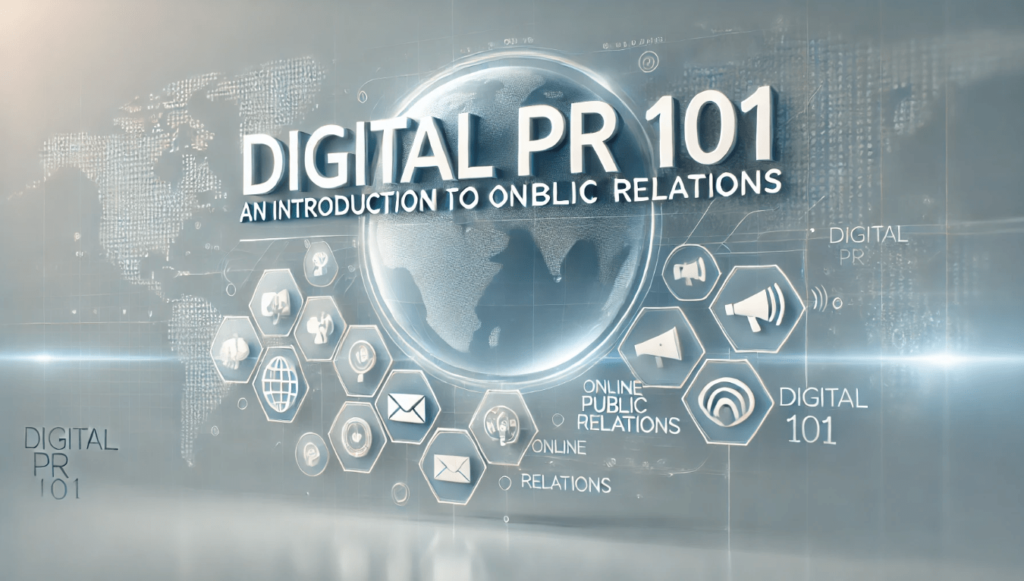In the digital age, the landscape of public relations (PR) has drastically changed. Traditional PR tactics, like sending press releases and pitching to journalists, are still relevant but now coexist with newer, more dynamic strategies. This blend of old and new is known as Digital PR. It’s a powerful tool for businesses looking to enhance their online presence, build brand authority, and engage with their target audience in meaningful ways. Here, we’ll dive into the basics of Digital PR, its importance, and how you can leverage it effectively for your business.
What is Digital PR?
Digital PR is the practice of using online strategies to manage and improve the reputation of a brand or individual. It combines traditional PR methods with content marketing, social media, SEO (Search Engine Optimization), and influencer outreach. The goal is to increase online visibility, drive traffic to websites, and ultimately, boost sales and brand credibility.
Why is Digital PR Important?
- Enhanced Online Presence: In today’s digital world, a strong online presence is crucial. Digital PR helps your brand get featured in reputable online publications, blogs, and social media platforms, increasing your visibility and reach.
- Improved SEO: Quality backlinks from authoritative websites can significantly boost your search engine rankings. Digital PR campaigns focus on earning these backlinks, making your site more discoverable to potential customers.
- Brand Authority and Trust: Being mentioned by respected sources can enhance your brand’s credibility. When your audience sees your name associated with trusted websites, they are more likely to trust your brand.
- Engagement and Relationships: Digital PR allows for direct interaction with your audience. Through social media and online communities, you can engage with your customers, gather feedback, and build strong relationships.
- Crisis Management: The internet never sleeps, and neither do potential PR crises. Digital PR provides tools to monitor online mentions of your brand and address issues quickly before they escalate.
Key Components of Digital PR
- Content Creation: High-quality content is the backbone of any Digital PR strategy. This includes blog posts, articles, infographics, videos, and more. The content should be valuable, relevant, and shareable to attract both readers and links from other websites.
- SEO: Understanding and implementing SEO best practices is crucial. This involves keyword research, optimizing on-page elements (like titles and meta descriptions), and building a strong backlink profile.
- Social Media: Social media platforms are essential for distributing content, engaging with audiences, and amplifying your message. Each platform has its own unique culture and best practices, so tailor your approach accordingly.
- Influencer Outreach: Collaborating with influencers can help amplify your message to a larger, more engaged audience. Choose influencers whose values align with your brand and whose followers match your target audience.
- Media Relations: Building and maintaining relationships with journalists and bloggers is still vital. They can help you gain exposure by featuring your content or mentioning your brand in their articles.
Steps to Develop a Digital PR Strategy
- Set Clear Goals: What do you want to achieve with your Digital PR efforts? Whether it’s increasing brand awareness, driving website traffic, or improving your SEO, having clear goals will guide your strategy.
- Understand Your Audience: Know who your target audience is and what interests them. This will help you create relevant content and choose the right platforms for distribution.
- Create Compelling Content: Content is king in Digital PR. Create high-quality, engaging content that provides value to your audience. Use various formats like articles, videos, infographics, and podcasts to keep things interesting.
- Build Relationships: Network with journalists, bloggers, and influencers in your industry. Building genuine relationships can lead to valuable media coverage and backlinks.
- Leverage Social Media: Use social media platforms to share your content, engage with your audience, and amplify your message. Each platform has its own strengths, so tailor your strategy to fit each one.
- Monitor and Measure: Use tools to monitor online mentions of your brand and track the performance of your Digital PR efforts. Analyze the data to see what’s working and adjust your strategy as needed.
Tips for Successful Digital PR Campaigns
- Be Authentic: Authenticity resonates with audiences. Be genuine in your communications and interactions. People can tell when a brand is being insincere.
- Stay Current: The digital landscape is constantly evolving. Stay up-to-date with the latest trends, tools, and best practices to keep your Digital PR strategy effective.
- Be Proactive: Don’t wait for opportunities to come to you. Reach out to journalists, pitch story ideas, and create content that addresses current events and trends.
- Engage with Your Audience: Respond to comments, answer questions, and participate in discussions. Showing that you care about your audience’s opinions builds trust and loyalty.
- Measure Success: Use analytics to measure the success of your campaigns. Look at metrics like website traffic, social media engagement, and backlink quality to gauge the effectiveness of your efforts.
Common Digital PR Tools
- Google Analytics: For tracking website traffic and understanding user behavior.
- SEMrush: For keyword research, SEO analysis, and competitor insights.
- BuzzSumo: To find popular content and identify key influencers.
- Hootsuite: For managing social media accounts and scheduling posts.
- HARO (Help a Reporter Out): To connect with journalists looking for sources.
Conclusion
Digital PR is an essential component of modern marketing strategies. It blends traditional PR techniques with digital tools and platforms to create a robust approach to brand management. By focusing on content creation, SEO, social media, influencer outreach, and media relations, businesses can enhance their online presence, build trust, and engage with their audience more effectively.
Remember, successful Digital PR is about being proactive, authentic, and strategic. Stay current with trends, continuously measure your efforts, and be ready to adapt your strategy as needed. With the right approach, Digital PR can help you achieve your business goals and build a strong, positive reputation online.

